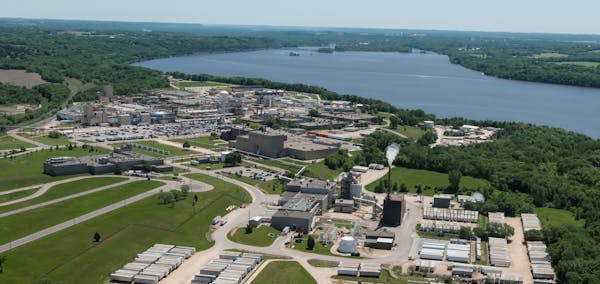3M Co. has agreed to pay a $2.8 million penalty for hazardous waste violations associated with its now-shuttered incinerator in Cottage Grove.
Since 1996, 3M repeatedly misidentified hazardous waste shipped to the incinerator as nonhazardous — one of a series of violations the Minnesota Pollution Control Agency (MPCA) discovered during a two-year investigation, the regulator said Thursday.
Nearly all the violations were at the hazardous waste storage and incineration site on the sprawling 3M complex on the Mississippi River. Other violations included failing to verify levels of mercury, lead, nickel, cadmium, arsenic and other hazardous materials in 1,800 waste streams from 2014 to 2020.
3M has already finished two dozen corrective actions to bring the facility into compliance as part of the new enforcement action, the MPCA said. That involved measures such as more frequent inspections of storage containers.
MPCA Assistant Commissioner Kirk Koudelka called the penalty one of the largest in the agency's history.
"We are disappointed with these violations," Koudelka said in an interview. "The good news is the incinerator is now closed."
Local lawmakers responded with exasperation. Sen. Karla Bigham, DFL-Cottage Grove, issued a statement calling 3M's repeated disregard for the law "unacceptable." The state needs to look at stiffer penalties for repeat offenders, she said. In an interview she said she's pleased the incinerator is closed but feels "exhausted" by the history of problems.
"It is unfortunate that time and time again we have to continue to have this discussion over 3M," Bigham said.
Koudelka said the MPCA did not order 3M to shut it down, but that the agency was pressing the company to get into compliance when 3M announced its decision. 3M said the decision was separate from the investigation.
As serious as the violations were, they did not result in any unpermitted air pollution, Koudelka said. "Our air permits are built on health standards," he said.
3M announced last August that it planned to shut down the hazardous waste incinerator at Cottage Grove and shift waste management work to Massachusetts-based Clean Harbors.
The state's only hazardous waste incinerator, 3M's facility stored and burned waste shipped from the company's North American operations. It was permitted to burn a maximum of about 11 tons of sludge, solvents and other waste per hour.
3M spokesman Sean Lynch issued a company statement saying it voluntarily disclosed to regulators in June 2020 that it was out of compliance.
"These matters were primarily related to waste evaluation and labeling, handling, and storage," the 3M statement said. "Emissions monitoring and testing data indicates that all materials were safely treated at 3M's incinerator.
"We will continue to be a positive presence in the Cottage Grove community," the company said.
It's the second enforcement action in just over a year for 3M's Cottage Grove operations.
In May 2021, 3M paid $80,000 for hazardous waste violations there that involved a release of extremely toxic hydrofluoric acid. Emissions monitoring and testing data indicated that all materials were safely treated at 3M's incinerator.
The Cottage Grove facility is the focus of another ongoing MPCA investigation, this one related to discharges of polyfluoroalkyl and perfluoroalkyl substances, or PFAS, which are compounds 3M pioneered. Known as "forever chemicals," PFAS don't easily break down. Koudelka confirmed the investigation continues, but said he couldn't discuss details or say when it would be done.
3M's Cottage Grove complex was the focus of the state's $5 billion lawsuit against the company for polluting Washington County groundwater with PFAS. The state settled the litigation in 2018 for $850 million.
The east metro is struggling to address that water contamination, as more PFAS pollution has come to light.
Rep. Keith Franke, R-Cottage Grove, called the unresolved investigation "one more thing to worry about."
PFAS have "just been horrible for our communities," Franke said. "Once again, here we are wondering and worrying. The majority of communities I represent are all hooked up to filtration systems."

Want to share info with the Star Tribune? How to do it securely

'Safe recovery sites' would offer syringes, naloxone and more to people using drugs. The plan could be in peril.
New Minnesota GOP leaders seek peace with party's anti-establishment wing

Who is Republican Lisa Demuth, Minnesota's first House speaker of color?

